Main AO3: Igniting_Quill | Side AO3: BeepBoop | Main Tumblr: @igniting-quill
Don't wanna be here? Send us removal request.
Text
Cozy Fantasy and Why It Doesn't Work
I think I am among many who feel like they should love cozy fantasy and have found it an incredibly lacking genre.
This newly branded "cozy fantasy" genre that has taken readers by storm since 2020 and while it is new that books are now marketed as cozy, the genre itself isn't new. Howl's Moving Castle by Diana Wynne Jones is a great example of the genre before it was labeled and also how to make it work.
Cozy fantasy is defined by many as fantasy with low stakes. Fantasy aesthetic but less sword fights. On paper, it sounds great. But the execution has been less than stellar for readers like me. The lack of physical stakes has also impacted the emotional stakes of these books, creating forgettable characters with boring problems. As a romance reader, I find this frustrating. Romance is known for being a predictable and formulaic genre, the now defunct Romance Writers of America defined romances as needing happy endings, a term romances have continued to follow. Yet these romance texts manage to have low physical stakes (how to date your neighbor, how to confront your toxic friends, etc) while still maintaining high personal stakes that keep readers invested and begging for more. So I was initially confused why cozy fantasy authors struggle to write texts that connect to readers like me.
I think I have found the answer which is the genre is just here for vibes. It is all about aesthetic, not even worldbuilding that fantasy is known for as most cozy fantasy I read have so many problems as soon as you ask one question. It is hard to acknowledge that a genre that is pitched to work for readers like me doesn't work for many of us. Especially because occasionally there is one that works beautifully to my taste.
I often say my favorite cozy fantasies that are more contemporary are short and visual, which I plays into the idea of the genre being an aesthetic. The Bakery Dragon by Devin Elle Kurtz is a good example because it is a simple story that is given the perfect amount of pages and gorgeous visuals without dragging on when the message is very clear and easy to understand. Books like The Phoenix Keeper and Legends and Lattes have absolutely nothing for me, their very clear message hitting the reader over and over so the readers don't miss it and focusing on the aesthetic of worldbuilding rather than the reality of the fantastic elements within the world.
I guess my point is. . . I realize this genre isn't for me since I have realized it is more of an aesthetic than anything. .. .but I want it to be. Should I let it go and put my efforts elsewhere? Or should I keep exploring this new trend and find the hidden gems?
2K notes
·
View notes
Note
I didn’t realize you were the person who did the fanfiction tag drinks.

ahah yeah that's meeee!!
If you guys are interested they are all available as stickers on my RB!!
42K notes
·
View notes
Text
My #1 recurring thing as an editor is to guide people away from writing shyly and defensively. If you preempt aggression and try defuse it in your writing itself, you are showing your belly. The audience wants blood.
12K notes
·
View notes
Text

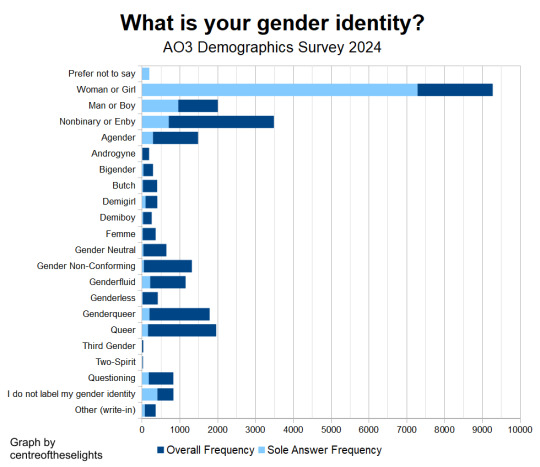
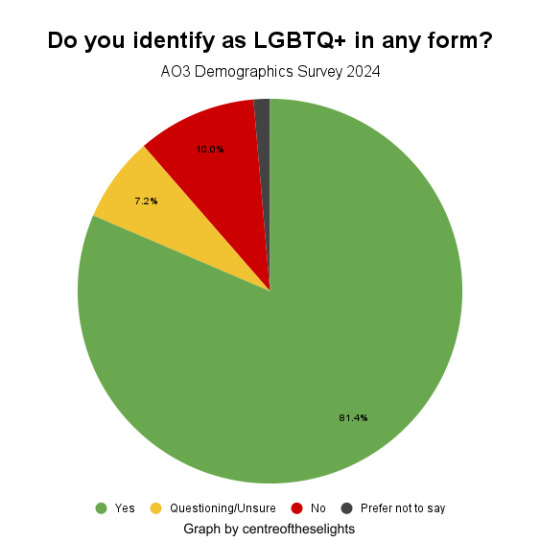
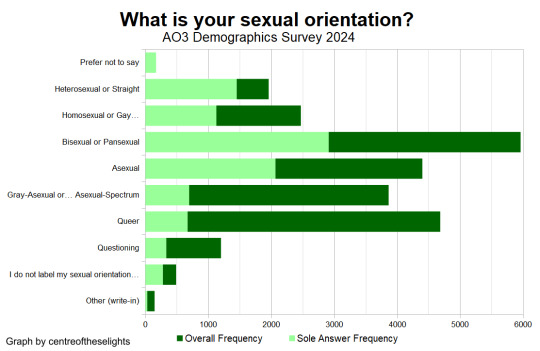


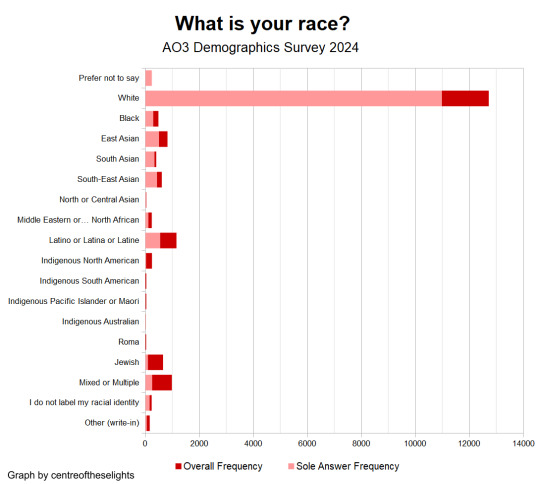




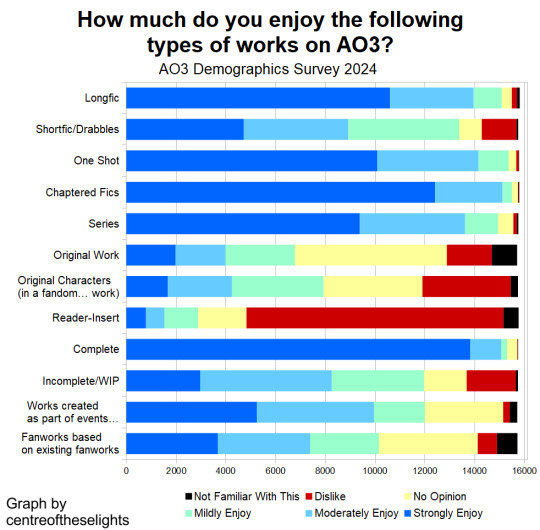


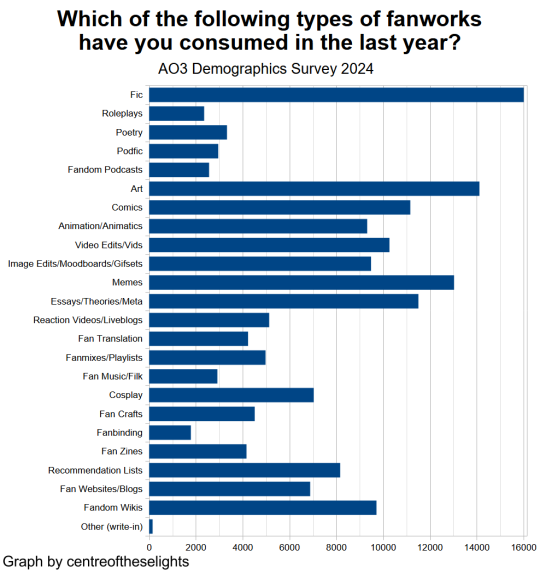
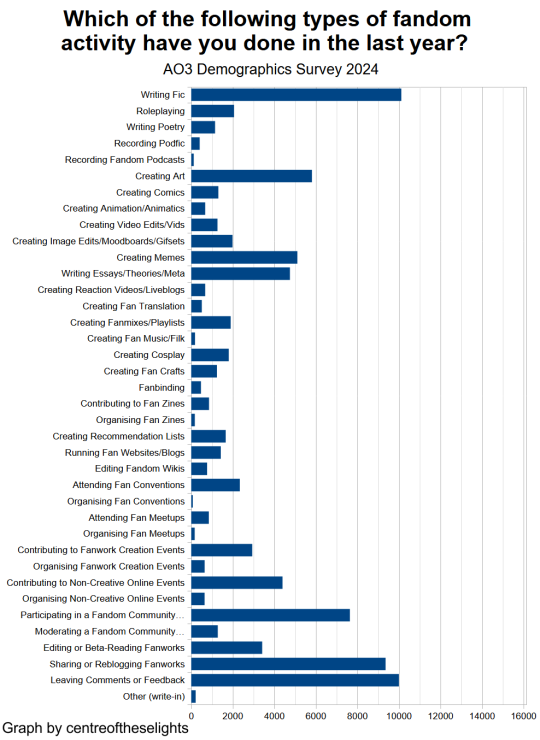


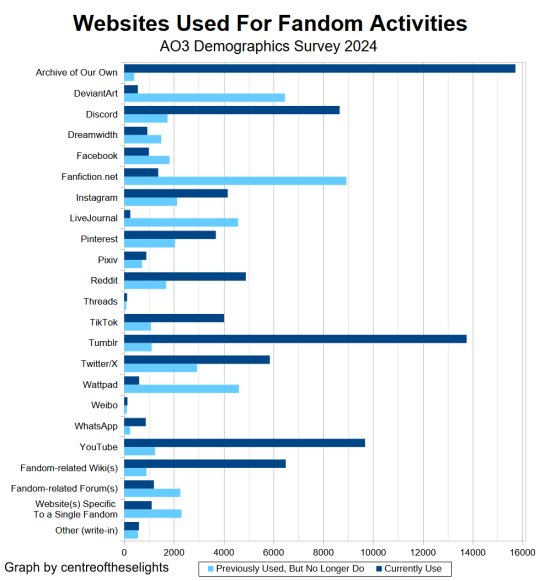

The AO3 Demographics Survey 2024 was an unofficial demographics survey of 16,131 AO3 users conducted in January 2024. We have just finished posting our initial results, so here is just a taste of the graphs and data you can check out now over on AO3!
We will be continuing to work on this project in the New Year, so please make sure you follow this blog or subscribe to the project on AO3 to keep up to date.
A full list of the survey questions with links to the relevant data is below the cut!
Demographics
How old are you?
Do you identify as LGBTQ+ in any form?
What is your gender identity?
Do you identify as any of the following? (LGBTQ+ related identities)
What is your sexual orientation?
What is your romantic orientation?
What is your race?
Is English your native language?
Which geographic region best describes your current place of residence?
Which religious or spiritual tradition(s) do you believe?
Do you experience the following? (Disability, Neurodivergence, and Health Conditions)
Usage of AO3
Which of the following AO3 activities have you done in the last twelve months?
How frequently do you use the following methods to find works on AO3?
In a typical week, how long do you spend on AO3 or reading downloaded AO3 works?
When did you begin using AO3, with or without an account?
When did you create your first AO3 account?
What languages do you use for reading and posting on AO3?
Works You Post On AO3
Which of the following types of works do you post on AO3? (Media)
Of the works you post on AO3, how often do you post works with the following ratings?
Of the works you post on AO3, how often do you post works focused on the following types of relationships?
Of the works you post on AO3, how often do you post works in the following genres/tags?
Of the works you post on AO3, how often do you post the following types of works? (Format & Miscellaneous)
Works You Consume On AO3
Which of the following types of works do you consume on AO3? (Media)
How much do you enjoy works with the following ratings on AO3?
How much do you enjoy works focused on the following types of relationships on AO3?
How much do you enjoy works in the following genres/tags on AO3?
How much do you enjoy the following types of works on AO3? (Format & Miscellaneous)
Fandom Beyond AO3
Which of the following types of fanworks have you consumed in the last year?
Which of the following types of fandom activity have you done in the last year?
Which of the following websites or apps do you currently use for fandom activities at least once a month?
Which of the following websites or apps have you previously used for fandom activities, but no longer regularly use?
When did you first begin participating in fandom?
How many fandoms have you considered yourself a part of in the last five years?
Which of the following types of media do you participate in fandoms for?
2K notes
·
View notes
Text
Writing Reference: Medicinal Herbs

10 plants for your character's medicinal herb garden
PLANT — When to Plant — Conditions & Care — Medicinal Uses
ALOE VERA — spring/autumn — sunny site indoors; pot up as needed; do not overwater — fresh plant gel for minor burns and wounds
CALENDULA — spring/autumn — well-drained soil; full sun; remove dead flower heads — cream for cuts, scrapes, inflamed skin; infusion for fungal infections
COMFREY — spring/autumn — warm sunny site; moist soil — ointment or poultice for sprains and bruises (use the leaf only)
FEVERFEW — autumn/spring — well-drained or dry, stony soil in sun — fresh leaf or tincture for headaches and migraines
LEMON BALM — spring/autumn — moist soil in sun; cut back after flowering — infusion for anxiety, poor sleep, and nervous indigestion; lotion for cold sores
PEPPERMINT — spring/autumn — sunny but moist site; do not allow to dry out — infusion for indigestion and headaches; lotion for itchy skin
ROSEMARY — spring/autumn — sunny sheltered site; protect with burlap in winter — infusion as a stimulating nerve tonic and to aid weak digestion
SAGE — autumn/spring — well-drained or dry, sunny, sheltered site — infusion for sore throats, mouth ulcers, and diarrhea
ST. JOHN'S WORT — spring/autumn — well-drained to dry soil with sun or partial shade — tincture for depression and menopause; infused oil is antiseptic and heals wounds
THYME — spring/summer — well-drained soil, may need a layer of gravel; sunny site — infusion for coughs, colds, and chest infections; lotion for fungal infections
Source ⚜ More: Notes & References
5K notes
·
View notes
Text
feedback and fic in fandom (3 f's of our own)
This conversation about feedback on fic says everything I’ve been wanting to say better than I could say it. But I’ll go ahead and try anyway.
Over the last five years or so there have been some great discussions around the rise of commodification of fanworks and decline of fandom community. This commodification looks a bit like enshittification of the internet: a cool site exists; its popularity makes someone realize they can get money from it; it has more and more ads; the site adds features to drive engagement, including The Algorithm; the things that made the site cool start to fall away. The site exists now as a vehicle purely to get clicks, and the people on it are on it solely to get clicks—to make money, to be successful, for some kind of social cachet.
AO3 doesn’t have advertisements. It’s not making money. But what is happening to fandom is proof of concept that enshittification changes the way we as humans engage. A cool website in 2004 was often a community space where you could meet people, have conversations, find cool things, and make cool things. A cool website in 2024 is either a content farm that will continually feed you enough content to hold your attention, or a social media site where your participation will come with stats to show you whether you are holding the attention of others.
AO3 wasn’t built to be a community space. It doesn’t have great functions for meeting people and having conversations. The idea was that, because fandom community spaces already existed, AO3 would serve the part of that community where you can find the cool things and store the cool things you made. It was meant to be a library in a city, not the whole city itself.
But it was also never meant to be a website in 2024, a content farm constantly generating content solely for your clicks and eyeballs and ad revenue, or a social media site where the content creators themselves vie for your clicks and eyeballs.
The most common talking point when people discuss the enshittification of fandom is the folks out there who are treating AO3 as that first kind of enshittified website: the content farm. This discussion is about how people treat fanfic as a product for consumption.
The post that kicked off the discussion on @sitp-recs’s blog was about someone who wasn’t getting very many kudos or comments on their fic, and was feeling pretty demoralized about it, then joined a discord server and found an entire channel dedicated to people loving their fic. But those on that server had never come to share that love with the author, which the author found really discouraging.
There are more and more stories like this. Someone on tiktok pulls a quote from a fic on AO3 and makes a 10-second video with them staring at a wall, the quote pasted at the bottom, music playing over it. It has 100,000 hearts, and 100 comments with people gushing over the fic, which has 80 kudos on AO3. Overall, people notice more and more hits on their fics, but fewer and fewer comments or even kudos. Fewer and fewer people seem to feel the need to interact with the author, instead treating the fic like a product to be used and discarded—which the enshittified internet (a stunning feature of late-stage capitalism!) encourages. The fandom community is dying, these stories conclude.
I agree. 100%. Both of the stories above have happened to me—viral tiktoks about my fic, secret discord channels to follow and discuss my fic—and let me tell you, it fucking sucks.
But from these observations about fandom enshittification, the discussion continues in a very odd direction. The solution to the death of fandom community is our favorite enshittification buzzword: engagement. We should engage the authors. They’re producing these products for free. We consume them at no cost. We must demonstrate our gratitude by paying them back.
It’s as though the capitalist consumption that the enshittified web encourages is so ingrained within us that we must think in terms of payment, in terms of exchange, transaction. Or as though, by forgoing payment, authors are some kind of martyrs defying capitalism, and the only way to honor their great sacrifice is comments and kudos.
Indeed, the discourse around this sometimes does veer away from capitalist rhetoric into something that smells almost religious in desperation. Authors are gods who bestow us mere mortals with the fruits of their labor benevolently, through love; the least we can do is worship them. Meanwhile the authors adopt the groveling sentiment of starving artists: I produce great art; I only humbly ask that you feed me in return.
These kinds of entreaties make my skin crawl for a number of reasons. I’m not a god. I’m not writing because I love you. I don’t expect your worship or even your praise.
I think the thing that disturbs me the most about it is that it suggests that authors (or, if the OP is feeling generous fan work creators) are the most important people in fandom. I’ve even seen posts stating that without creators, fandom wouldn’t exist—as though readers aren’t just as important. As though conversations where people discuss characterizations and plot points and randomly spin out interpretations and ideas and thoughts related to canon are meaningless. I’ve even seen people scramble to include folks having these discussions as “creators,” as though realizing that these people are necessary and integral to fandom communities but unable to drop the idea that the producers are the ones who are important. As though that person who just lurks can never count.
Is this what community is? When you join the queer community, are you expected to produce a product of your queerness? If not, must you actively participate and give back to the queer community in order to be considered a part of it? Or is it enough that you are queer, that you exist as a queer person and want to be around others who are queer, you want to be a part of something? What is community, anyway?
The problem with people raising the authors above everyone else in the community and demanding that tribute be paid is that they are decrying the “content farm” style of 2024 website out of one side of their mouth, but out of the other side are instead demanding that AO3 become a 2024-style social media website. Authors are influencers. “Engagement” and clicks are the things that really matter. They are in fact suggesting that the way to solve the commodification of fanfic is by “paying authors back” with stats.
Before anyone comes at me with the idea that comments aren’t just “stats,” I will clarify what I mean. There are literally hundreds of posts on tumblr alone claiming that any comment “helps” the author. Someone replies that they are shy to comment. Someone else replies that incoherent keyboard smashes, a single emoji, or the comment “kudos” are all that is required to satisfy the author, all that is required as tribute—all that is required as payment to keep this economy healthy.
I’m not condemning the comments that are keyboard smashes or emojis or a single kind word. I receive them. They make me happy. If anyone wants to leave such a comment on my fics, I’m really grateful for it. But this is not community-building. This is a transaction. In @yiiiiiiiikes25’s excellent response in the post linked at the beginning, they point out that “you have a cool hat” is something that is “perfectly nice” to hear from someone—and it is! We all want to be told we have a cool hat! But as they go on to say, what builds community is interactions that are deep and specific, interactions that are rich in quality, not in quantity. A kudos or a comment that says only ❤️are lovely things to receive, but they don’t build community.
My reaction, when I see people begging for kudos and comments as the only means by which to keep fandom community alive, is very close to @eleadore's. I want to say, “No. Readers do not need to comment or kudos. Believe not these hucksters who claim to know the appropriate method of fandom participation. Participate as you feel able, or not at all; nothing is required of you.”
I’ve been told before (several times) that I’m not qualified to participate in such discussions because I am an established author who has some fics with very high stats. It doesn’t matter that I have also been a new writer with almost no one reading my fics. It doesn’t matter that I still write in new fandoms where no one in that fandom knows me. It doesn’t matter that I, like any human being, still care about receiving recognition and attention and praise.
And maybe that’s correct. I personally don’t think that billionaires have a place in deciding the direction of the economy, and--if we're really going to consider fandom an economy--in fandom terms, if I’m not a billionaire, or even a millionaire, I’m definitely in the infamous “one percent.” So, just as no one wants to hear Elon Musk say “money isn’t everything,” maybe it’s not my place to say “kudos isn’t required, actually.”
That said, I’m not the only one who has a problem with the stats-based discourse around fandom community. However, the main counter-response to this discussion I see goes something like this: you shouldn’t be writing fic for validation. If you’re writing for attention, you’re doing it for the wrong reason. Authors should write fic because they love it without any expectation of return.
This is, in my opinion, missing the point of what is meant by fandom community.
I wrote fanfic before I knew that fanfic, as a concept, existed. I read books; I wanted them to be different; I wrote little stories for myself with new endings, with self-inserts, with cross-overs, with alternate universes. I did it for myself in the 90s. It never occurred to me that anyone else would do this, much less that people would share.
As @faiell points out—creating and sharing are two different things. I created fics for myself, but I decided to share them in the early 2000s because other people might like them, too. And of course, I wanted to hear whether other people liked them. How could I not? I might decorate my home just for me and not for anyone else’s preferences, but when people come over and say my house is nice, how can I not enjoy that? And if a lot of people think my house is nice, which encourages me to post pictures of it online, isn’t it understandable I might do so with the hope that more people will say my house is nice? And, honestly, if no one is appreciating my pictures, I probably won’t continue to go through the trouble of taking them and posting them. I’ll just enjoy my house that I decorated without sharing, the end.
When I found out there were whole fannish communities where people discussed canon and tossed ideas around about it, made theories and prompts and insights into the characters, fics they had written and recs for other fics and analyses of fics and art based on fics and fics based on art—I wanted to be a part of that, too. Now, sometimes, I write fic not out of an internal need to do so but out of a desire to participate in that community.
The idea that we write fic only for the love of it, then post it only because we possess it, is a process entirely centered on the self. It’s fandom in a vacuum. The idea that we share this thing, that we feel pleasure if someone likes it but feel nothing at all if no one says anything about it, that it’s completely okay to be ignored and unseen—that’s not what a community is either. That’s some weird sort of self-aggrandizement through self-effacement—because yes, there is often a weird kind of virtue-signaling in this kind of discourse.
I say this as someone who has virtue-signaled in that way: “some people write for stats, but I write for myself.” It’s bullshit. Sure, I write for myself, but why post it on the internet? Honestly, said virtue has a whiff of the capitalist machine, which would like you to produce for the sake of production, work for the sake of work. The noblest among us expect no recompense for that which they give!
The reason that I’m bringing this back around to capitalism is that capitalism actively works to dismantle community. The reason that folks are out here pleading for “engagement” in order to “pay back” authors for the products they give us “for free” is because people no longer even have the language to discuss how to participate in meaningful community. And frankly, how to build back fandom community, in the face of enshittification, is getting harder and harder to see.
But I do think that if we value fanfic and the fanfic community, it’s really, really not constructive to judge whether someone’s reasons for writing fanfic are valid. It’s also weird to me that it would be considered wrong that someone’s reason for sharing fanfic is because they would like to receive some recognition for it, when in fact that seems to be the most natural reason in the world for sharing something so private and vulnerable with the world.
Let’s go back to that idea of how hurtful it is to find out your fanfic is trending on tiktok without anyone from tiktok saying anything to you about your fic, or how it can be painful to find out there’s a secret discord channel dedicated to your fic. The people who respond to that with, “Ah, but you shouldn’t be writing to get attention!” are missing the point. The fic did get attention. It got lots. Attention obviously wasn't why the writer was writing--they were writing to participate, and they didn't get to. At all.
However, if your conclusion is that the author was upset because these particular stats were not accruing under this author’s profile, thereby preventing them from achieving the vaunted status of BNF and influencer—I don’t know, maybe you’re right. But I don’t think that’s why I, personally, have been hurt by these things, and I doubt it’s what hurt the people in these posts either. They’re hurt because they want to participate, and they have been systematically excluded by the very people they thought were part of the community they thought they could participate in.
Sure, if those folks from tiktok and the discord server all came and showered the author with kudos and comments that said “kudos,” the author might have felt satisfied enough with the quantity of this recognition that they would continue writing. But in the end, this still does nothing to address the problem of fandom community, in which the deep, meaningful recognition, interactions, and relationships in fandom are getting harder and harder to have and to build, as a result of how people now expect to engage in online spaces.
So, how to address the problem of fandom community? You probably read this long, long post hoping that I had an answer, and for that I must apologize. I don’t have solutions. My intent was to be descriptive, rather than prescriptive. I wished to outline the problems that I’m seeing in what was hopefully a slightly new or at least thought-provoking way, rather than offer solutions.
But, now that I’m talking about being prescriptive, maybe I can offer one suggestion, which is—maybe the solution to this isn’t about prescribing behavior. I do understand the irony in writing a prescription saying we shouldn’t prescribe people, but I’m going to write it anyway:
Maybe we shouldn’t be telling anyone the appropriate reasons for writing fanfic or for sharing it. Maybe we shouldn’t be telling readers they need to kudos or need to comment. If we’re going to go pointing fingers, we should be pointing at the institutions of capitalism that have made the internet what it is today—but I don’t think that’s going to solve the problem either.
But I do think that describing this problem, understanding what it actually is, not blaming readers for it and not blaming authors for it—I do think that helps. The discussion I linked at the beginning of this post is what I think of as the fandom I miss, the fandom that's now harder and harder to access, the fandom that is dying. That fandom was a social space where people had opinions and disagreed and went back and forth and gazed at their navels and then talked about Buffy the Vampire Slayer.
In the words of @yiiiiiiiikes25, it was a fuckin’ discussion about hats. And we’re hungry for it.
2K notes
·
View notes
Text
how to write fight scenes
many people have told me that Chum has good fight scenes. a small subset of those people have asked me on advice for how to write fight scenes. i am busy procrastinating, so i have distilled my general ethos on fight scenes into four important points. followed by a homework assignment.
Fight scenes take place on two axii - the physical and the intellectual. For the most interesting fight scenes, neither character should have a full inventory of the other's abilities, equipment, fighting style, etc. This gives you an opportunity to pull out surprises, but, more importantly, turns each fight into a jockeying of minds, as all characters involved have to puzzle out what's going on in real time. This is especially pertinent for settings with power systems. It feels more earned if the characters are trying to deduce the limitations and reach of the opponent's power rather than the opponent simply explaining it to them (like in Bleach. Don't do that). 1a. Have characters be incorrect in their assumptions sometimes, leading to them making mistakes that require them to correct their internal models of an opponent under extreme pressure. 1b. If you really have to have a character explain their powers to someone there should be a damn good reason for it. The best reason is "they are lying". The second best reason is "their power requires it for some reason".
Make sure your blows actually have weight. When characters are wailing at each other for paragraphs and paragraphs and nothing happens, it feels like watching rock 'em sock 'em robots. They beat each other up, and then the fight ends with a decisive blow. Not interesting! Each character has goals that will influence what their victory condition is, and each character has a physical body that takes damage over the course of a fight. If someone is punched in the gut and coughs up blood, that's an injury! It should have an impact on them not just for the fight but long term. Fights that go longer than "fist meets head, head meets floor" typically have a 'break-down' - each character getting sloppier and weaker as they bruise, batter, and break their opponent, until victory is achieved with the last person standing. this keeps things tense and interesting.
I like to actually plan out my fight scenes beat for beat and blow for blow, including a: the thought process of each character leading to that attempted action, b: what they are trying to do, and c: how it succeeds or fails. In fights with more than two people, I like to use graph paper (or an Excel spreadsheet with the rows turned into squares) to keep track of positions and facings over time.
Don't be afraid to give your characters limitations, because that means they can be discovered by the other character and preyed upon, which produces interesting ebbs and flows in the fight. A gunslinger is considerably less useful in a melee with their gun disarmed. A swordsman might not know how to box if their sword is destroyed. If they have powers, consider what they have to do to make them activate, if it exhausts them to use, how they can be turned off, if at all. Consider the practical applications. Example: In Chum, there are many individuals with pyrokinetic superpowers, and none of them have "think something on fire" superpowers. Small-time filler villain Aaron McKinley can ignite anything he's looking at, and suddenly the fight scenes begin constructing themselves, as Aaron's eyes and the direction of his gaze become an incredibly relevant factor.
if you have reached this far in this essay I am giving you homework. Go watch the hallway fight in Oldboy and then novelize it. Then, watch it again every week for the rest of your life, and you will become good at writing fight scenes.
as with all pieces of advice these are not hard and fast rules (except watching the oldboy hallway fight repeatedly) but general guidelines to be considered and then broken when it would produce an interesting outcome to do so.
okay have a good day. and go read chum.
2K notes
·
View notes
Text
I'm wondering if, as a society who cares about vulnerable people, we could stop saying "traumatize" when we truly mean "upset"?
I am sick of hearing sad books or movies "traumatize" their readers. I simply do not believe that happens. A traumatic experience might be adjacent to books (I have vivid memories of books I was reading around certain experiences and even how the contents of those books affected my processing of the experiences). But it's not caused by the book. And, y'know. The weather is Christofascist Censorship Attempts outside.
Meanwhile from the other side I continue to be surprised at just how badly people fail to understand trauma and traumatic experiences in general. Watering down the term isn't helping. Find other hyperbole to express that The Bridge to Terebithia gutted you, chewed on your heartstrings, and made you cry your first pair of contact lenses right out of your preteen eyes.
12K notes
·
View notes
Text
A guide to commonly used honorifics in 魔道祖师/The Untamed
OK - so, I’ve actually seen some confusion floating around on specific honorifics commonly used in 魔道祖师 and I figured I will put a post up to address some of this - especially the situations when they get used. Hopefully it’ll be helpful for fic writers or whoever else out there that’s getting turned around by the various translations.
As with most of Chinese vernacular, there’s a TON of similar, but different situations in which it may be permissible to use certain titles/honorifics, so bear in mind this is not an exhaustive guide. Also, I don’t have a PhD in Chinese honorifics or anything, I’m just a Chinese person that watches/reads a fair amount of historical dramas. So if I missed anything/if there was anything that was kind of unclear in the novel or drama, feel free to let me know!
公子 / gongzi/ master
Let’s start with the hardest so I can get this out of the way. You will see this translated in a variety of different ways - master, young master, sir…and they are all correct! Congratulations, you’ve hit the jackpot - depending on the situation, gongzi can be a whole hodgepodge of things.
Master: The most commonly used version in MDZS. This is a separate meaning of master from some of the honorifics discussed below - it is specifically used to address either:
Your literal master if you are a servant in the household
A somebody from a distinguished household in a polite way
General honorific: Gongzi can also be used between strangers/acquaintances as a respectful term. Gongzi is, in some ways, an indicator of respect of the other person’s status. So oftentimes you’ll find two young masters from different sects referring to each other as gongzi politely, but you wouldn’t find two beggars on the street calling each other that. and it’s usually used to address someone younger or a similar age as you. If you‘re talking to someone who is clearly your senior, use 前辈 or 先生.
Because it has the connotation of youth and aristocracy associated with it, oftentimes innkeepers/sellers may use gongzi to address male customers (particularly youthful men) because it’s a bit more flattering. Kind of like how the modern day shopkeeper calls you ‘美女’ (beauty) or even ‘亲爱的’(my dear - IDK when this started becoming a thing but if you do any online shopping on Taobao you know what I’m talking about) in China. They don’t actually think you’re beautiful/feel affection for you, it’s just a way of addressing the customer to make you feel good about yourself HA. It’s nice to be called gongzi even if you’re not actually a noble.
There’s variants of this - 小公子/ xiaogongzi is typically young master, although I think some translations just directly use the young master for gongzi. It can also mean the younger master if there is an older sibling in question here (e.g. Wen Chao was referred to as 温小公子 as he was the younger son), although you can also use 二公子 (second master), as many do when referring to Lan Wangji. It sounds a little less juvenile.
This term is used for guys - I would say the female equivalent could be 千金/ qianjin or 小姐 /xiaojie.
Keep reading
3K notes
·
View notes
Note
Words to describe blood without saying crimson or blood?
Blood—the fluid that circulates in the heart, arteries, capillaries, and veins of a vertebrate animal carrying nourishment and oxygen to and bringing away waste products from all parts of the body
Arterial - relating to or being the bright red blood present in most arteries that has been oxygenated in lungs or gills
Body fluid - a fluid or fluid secretion (such as blood, lymph, saliva, semen, or urine) of the body
Carmine - a vivid red
Cerise - a moderate red
Claret - a dark purplish red
Clot - a coagulated mass produced by clotting of blood
Cruor - obsolete: the clotted portion of coagulated blood
Ensanguine - to make bloody; crimson
Geranium - a vivid or strong red
Gore - blood, especially: clotted blood
Hematic - of, relating to, or containing blood
Hematoid - resembling blood
Hemoglobin - an iron-containing respiratory pigment of vertebrate red blood cells that consists of a globin composed of four subunits each of which is linked to a heme molecule, that functions in oxygen transport to the tissues after conversion to oxygenated form in the gills or lungs, and that assists in carbon dioxide transport back to the gills or lungs after surrender of its oxygen
Hemoid - resembling blood
Ichor - a thin watery or blood-tinged discharge
Incarnadine - bloodred
Juices - the natural fluids of an animal body
Maroon - a dark red
Plasma - the fluid part of blood, lymph, or milk as distinguished from suspended material
Puce - a dark red
Ruddle - red ocher (i.e., a red earthy hematite used as a pigment)
Russet - a reddish brown
Sanguine - bloodred; consisting of or relating to blood
Scarlet - any of various bright reds
Vermilion - any of various red pigments
More: Word Lists ⚜ Blood ⚜ Exsanguination ⚜ On Blood
7K notes
·
View notes
Text
you can take a quick pause from writing to fact-check something on the internet. but watch out
4K notes
·
View notes
Text
So... I found this and now it keeps coming to mind. You hear about "life-changing writing advice" all the time and usually its really not—but honestly this is it man.
I'm going to try it.

98K notes
·
View notes
Text
The angstiest masterpost
angsty.
Angsty family/platonic dialogue
Angsty question prompts #1
Angsty question prompts #2
Angsty question prompts #3
Angsty/fighting dialogue
Concerned/angsty question prompts
Angsty starters
Angst prompts
Angsty sentence starters #1
Angsty sentence starters #2
Angsty sentence starters #3
Angsty sentence starters #4
Leaving dialogue
Reunion dialogue reactions
Unwilling goodbye + love confession prompts
Trying to make them stay dialogue
Sacrificing dialogue
Amnesia prompts
Amnesia dialogue
Bad luck prompts
Lover being hurt prompts
Break-up dialogue #1
Break-up dialogue #2
Unwanted attention dialogue
Unrequited love dialogue
Drama starting points
Conflict for couples #1
Conflict for couples #2
Conflict for couples #3
Betrayal dialogue
Hiding from horror dialogue
Finding out the truth dialogue
"I'm sorry…" apology starters
Saying I'm sorry…
Apologizing for emotional neglect
Talking it out ideas
Keeping loved ones apart
Ending an argument
If you like my blog and want to support me, you can buy me a coffee or become a member! And check out my Instagram! 🥰
6K notes
·
View notes
Text
MASTERLIST ✍🏻
Hi! This post is a huge collection of all my writing tips in one place. I will update this list daily and add new posts
Writing Tips
How do i Plot a Book?
Childhood Friends to Lovers Gestures
Showing 'Fear' in Writing
examples of body language and action tags
Writing Trust Issues Tension
Quick Tips for Writing Emotional Tension
How to Write a Ruthless Character
Showing 'Anger' in Writing
12 Emotional Wounds in Fiction Storys
Gestures for Shared Moments
Symbolism in Writing
Instead of "Looked", consider
Words to Use Instead of "Said"
Showing 'Determination' in Writing
Showing 'Confusion' in Writing
Showing 'Anticipation' in Writing
Introduce characters
Showing 'Exhaustion' in Writing
Showing 'Excitement' in Writing
Writing a Morally gray character
Showing 'Jealousy' in Writing
Showing 'Love' in Writing
OC Developement
Eye Color to Define Your OC,
Describe your Main Character sheet
Body type and shape
Good Traits Gone Bad
Dialogues
Dialogue Prompts that Hurts
Jealousy Starters
Dialogue Prompts for Friendship
Dialogue Prompts for Unrequited Love
Gestures of Loss
When A Character Is dealing with anxiety they…
When A Character Is hilariously confused they…
Isolation Starters
Regretful gestures
Undermining Confidence Starters
When a character is Babysitting for the first time
Control Starters
Guilt-Tripping Starters
Soft angers Dialogue
Gaslightning Starters
Emotional Blackmail Starters
When A Character Is stuck in a never-ending traffic jam they…
Dialogue Prompts for Mystery/Thriller
When A Character Is dealing with an overenthusiastic fitness trainer they…
Confidence Starters
Prompts
Physical Intimacy Prompts
forced proximity prompts
When A Character Is feeling nostalgic they…
When A Character Is excited about something they…
Prompts for self-Doubt
When A Character Is excited about something they…
Grumpy & Sunshine Affection Prompts
Moral Dilemmas Prompts
when a Character us stressed they…
Supernatural Elements Prompts
Family Secrets Prompts
When A Character Is in a state of panic they…
Inner Conflict Prompts
Twist Prompts
Conflict Prompts
Signs of ….
Signs of Embarrassment
If You’re Writing a…
How to Create a Villain
If You’re Writing a Female Character, Avoid these Bad Writing Mistakes
Emotionally reserved characters
If you’re writing a character who is Naive
Writing Love
How to Write a Confession of Love
forbidden love prompts
When A Character Is in love they…
Signs of Falling in Love
Gestures for Expressing Love
Love Triangle Gestures
Writers Block
Ideas to Get Rid of Writer's Block Inspo
6K notes
·
View notes
Text
my advice to anyone who’s thinking about writing as a hobby would be that if you’ve already started thinking about it there’s nothing i can say that will save you so let it rip dude
9K notes
·
View notes
Text
An action scene isn’t about writing down every punch, kick, or swing of the sword. You’re not choreographing a fight for your reader, you’re throwing them into the moment, making them feel the intensity, the panic, the adrenaline. Focus on the emotions, the tension, the stakes. Show how the character’s thinking changes in the heat of the moment, how their survival instincts kick in, how their body reacts to the chaos. Make it fast, make it brutal, and don’t drag it out longer than it needs to be. Action is about urgency, not precision.
3K notes
·
View notes
Text
Fun AU Combos Part IV
I took my list of AUs and used a random number generator to create 10 AU combos, which may or may not seem crazy. Let’s see if they spark some ideas!
Assassins AU x Flower Shop AU
Historical AU x Soulmates AU
High School AU x Professional Rivals AU
Tattoo Shop AU x Friends with benefits AU
Bookstore AU x Spies AU
Firefighter AU x Cop AU
Ghost AU x Prison AU
Professional Rivals AU x Hogwarts AU
Arranged Marriage AU x Mermaid AU
Neighbors AU x Werewolf AU
Are both of the partners in the arranged marriage merpeople? Or just one of them?
More: AU & Trope Combos
741 notes
·
View notes